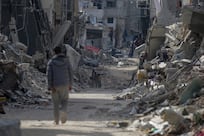DUBAI // Diana Hamade, one of the first female Emirati lawyers in the country, still raises eyebrows when she walks into court.
“Judges are shocked when a female stands up and argues,” said the founder of International Advocate Legal Services in Dubai. “They tell me, ‘you look like a woman who can do a better job at home’.
“Local judges look at me and ask, ‘why aren’t you home with your kids?’ I tell them my kids are happy with a lawyer mum. The law is completely a male-dominated field.”
The pioneering lawyer was at a discussion in Dubai on how the media can empower women, entitled Worth 100 Men: Identifying the Role of Media in Women’s Empowerment.
“Lawyers before me did not use the media. The media is our best tool,” Ms Hamade said.
She said the first woman to practise law in the UAE was licensed in 1991.
“Today, there are 40 female public prosecutors, 60 women lawyers in firms and two female judges in Dubai.”
Other discussion panellists said empowerment of women began at home.
“It is important to raise children who respect women from an early age,” said Mona Tavassoli, founder of Mom Souq, an online bazaar.
“We forget our children are the future decision makers. The change should start at home.”
Taghrid Al Saeed, head of digital communications at Mubadala, said: “Women reinforce stereotypes. We parrot them. We have to challenge ourselves.”
The event was organised by the Womanity Foundation, a Swiss foundation established in 2005 to raise the profile of women.
“Our goal is to find innovative solutions to empower women,” said Yann Borgstedt, its founder, who hopes to set up a base in the UAE.
“We are using media to portray issues in a non-confrontational way. We want to work in the region and Dubai is the right hub.”
Mr Borgstedt said his organisation planned to air a 30-episode Arabic radio show, Radio Fiction, on an aspiring Arab journalist and the challenges she faced.
The fictional journalist’s story is expected to touch on women’s role in society, their social and economic empowerment, participation in public life, domestic violence, sexual harassment and family relationships.
It will be broadcast in the UAE, Saudi Arabia, Jordan, Palestine and some North African countries, including Egypt, from April.
“We want to generate a debate on her and discuss topics like violence against women, salary discrimination against women, access to certain jobs and early marriage,” Mr Borgstedt said.
“We may be able to change perspectives and perhaps bring about a change in laws.”
pkannan@thenational.ae





